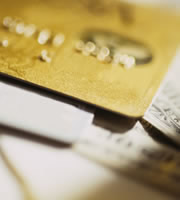Credit Card Rewards, Plus: Card Fraud

Credit Card Rewards: Reverse Robin Hood?
Robin Hood used to steal from the rich in order to give to the poor. Now a public policy discussion paper from the Federal Reserve Bank of Boston gets close to suggesting that credit card rewards programs achieve much the same–except in reverse.
The paper, published last Wednesday, says: “On average, each cash-using household pays $151 to card-using households and each card-using household receives $1,482 from cash users every year.” And it goes on to show that it’s low-income households that tend to use cash and high-income families who receive most through using their credit cards.
Credit Card Companies and Swipe Fees
The Fed’s hypothesis is based on how “interchange fees” (also known as “merchant fees” and “swipe fees”) are levied and funded. These interchange fees are the cut of the transaction value paid by merchants to credit card companies every time a card is swiped. And the paper’s authors argue that merchants pass the fees to all customers in the form of higher prices. They contend:
This retail price markup for all consumers results in credit-card-paying consumers being subsidized by consumers who do not pay with credit cards… cash buyers must pay higher retail prices to cover merchants’ costs associated with the credit cards’ merchant fees. Because these fees are used to pay for rewards given to credit card users, and since cash users do not receive rewards, cash users also finance part of the rewards given to credit card users.
Credit Card Rewards and You
Whether or not you believe the swipe fees system is fair, it is the system. Government can yet change it (it’s been on the agenda for some while), but, in the meantime, there seems little point in your denying yourself the benefits that a good rewards program can bring.
Credit Card Use Overseas
On Monday, this blog mentioned the difficulties that some Americans experience when trying to use a U.S.-issued credit card overseas because so many other countries have dumped swipe-and-sign cards in favor of chip-and-pin ones. As the latter’s name implies, these cards have replaced the magnetic strip so familiar over here with a microchip. Some retailers and virtually all automated payment machines can no longer handle American cards. The exception is ATMs, which should still work.
The Kansas City Star addressed this issue Wednesday, and suggested that it may be possible in some countries for tourists and business travelers to obtain–possibly from their hotels–a prepaid card. The card is loaded with euros and contains a chip, which could solve this problem. Why not ask your concierge or check when you book your room?
It’s not yet clear whether American credit card companies are likely to adopt chip-and-pin technologies. A payments risk analyst at the Atlanta Fed wrote a blog earlier this week that suggested that fraud would be cut significantly were they to do so, but also quoted one industry estimate of the likely cost–$8.6 billion. That’s a big investment, although making credit card use easier and safer would be a valuable prize.
Disclaimer:The information in this article is believed to be accurate as of the date it was written. Please keep in mind that credit card offers change frequently. Therefore, we cannot guarantee the accuracy of the information in this article. Reasonable efforts are made to maintain accurate information. See the online credit card application for full terms and conditions on offers and rewards. Please verify all terms and conditions of any credit card prior to applying.
This content is not provided by any company mentioned in this article. Any opinions, analyses, reviews or recommendations expressed here are those of the author’s alone, and have not been reviewed, approved or otherwise endorsed by any such company. CardRatings.com does not review every company or every offer available on the market.
Published (Modified )